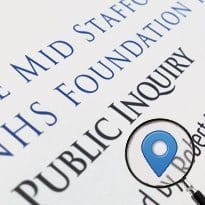Nuffield Trust warns against ‘big stick’
- 15 March 2013

The government should avoid the temptation to over-regulate the health service or to take a ‘big stick’ approach to getting trusts to improve, the Nuffield Trust has said.
In a response to the final report of Robert Francis QC’s public inquiry into the scandal at Mid Staffordshire NHS Foundation Trust, the think-tank says the government should instead look to clarify the roles of the different bodies that assess and monitor care in the health service, and improve the information available to them.
The response also discusses the range of data collection, analysis, and publication tools available to regulators, managers and the public, and makes suggestions for how they could be used to spot problems at individual, ward, and institutional level.
However, it warns that if the government instead chooses to wield a ‘big stick’ when it issues its response this month, it will simply “further alienate staff and reproduce the distortions created over the past decade by targets.”
Francis issued his final report on Mid Staffs at the start of February. It discussed who had been responsible for failing to spot or intervene in the failures that led to high death rates and desperately poor care at Stafford Hospital’s A&E department and on some of its wards.
Francis called for a change of culture across the health service, underpinned by new duties of candour and professionalism for managers and clinical staff, and a commitment to publishing more information for regulators, commissioners and patients.
The Nuffield Trust says it supports the creation of fundamental standards, but says these should be developed by the Care Quality Commission in collaboration with staff and users, and that they should take account of the information that is available to assess them.
As a starting point, it suggests that fundamental standards should first be developed for “frail, older people on acute wards”, and that this should “shape any new requirements for data collection in NHS trusts set by the NHS Commissioning Board or the CQC.”
It also suggests that careful consideration should be given to how the standards might be incorporated into the Ofsted-style ratings that health secretary Jeremy Hunt has demanded, and that it has been asked to explore in another project.
Although there is renewed enthusiasm for ratings in government and the press, the think-tank notes they have two big limitations; first, that “they may not predict future lapses in quality” and so “might lead to a false sense of security” and second that they will not pick up failures at anything other than an institutional level.
Similarly, although Sir Bruce Keogh’s investigation into 14 trusts with higher than expected mortality ratios has generated banner headlines, the think-tank notes that measures like the Hospital Standardised Mortality Ratio are difficult to interpret and that “by the time people are dying in sufficient numbers to detect on a mortality alert it is too late.”
Its response suggests that mortality ratios should be seen as just one source of information, and that other indicators should be brought together, in real time, “perhaps through an online facility.”
It suggests that the quality risk profiles already developed by the CQC for internal monitoring “are an important start”, while the quality accounts already produced by trusts could become an important source of public information, if they could be made “comparable and consistent”.
It also says GPs and commissioners need more and better information, particularly about complaints.
However, it notes that there are tensions between the duty of candour that Francis is demanding and the government’s market-oriented reforms, and between demands for higher standards and campaigns for local services that might not be able to deliver them.
Making the quality of NHS service more transparent “will only intensify the need to make difficult and controversial decisions about the volume and location of NHS services,” the response concludes.




